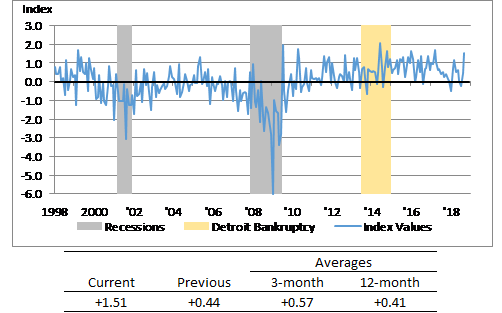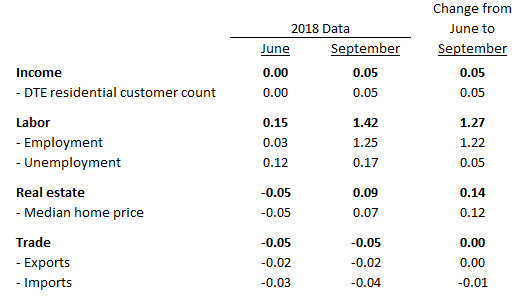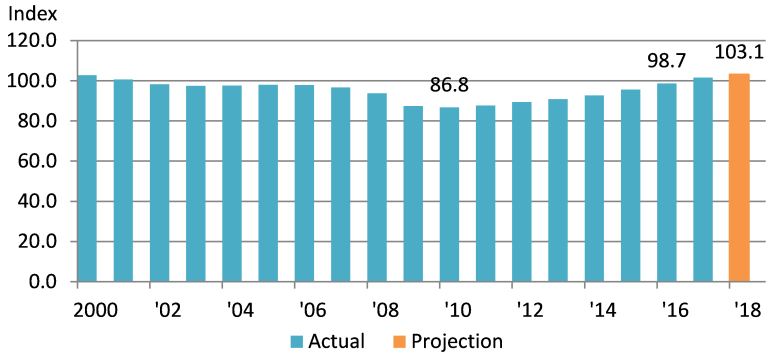Detroit Economic Growth Increased in September, According to Chicago Fed Index
The Chicago Fed’s Detroit Economic Activity Index (DEAI) was +1.51 in September, up from +0.44 in August. An index value greater than zero points to the city of Detroit’s economic activity growing faster than trend and a value less than zero points to the city’s economic activity growing slower than trend. The complete history of the index through September is shown below (chart 1).
Chart 1. Detroit Economic Activity Index (standard deviations from trend)

Table 1 below shows the contribution of each of the DEAI’s major categories (income, labor, real estate, and trade) as well as the contribution of the monthly series with the largest weight in each category. Only trade made a negative contribution to the DEAI in September, and the remaining three categories all improved from June.
Table 1. Contributions to the DEAI

The improvement in the income category’s contribution to the DEAI is explained in part by a 0.2% increase in residential electric customer counts from June to September. The jump in the labor category’s contribution to the DEAI is largely due to the following: Employment grew 0.2% between June and September and the unemployment rate fell by 0.4% over the same period. The contribution from the real estate category to the DEAI rose in large part because inflation-adjusted median single-family home prices increased by 4.0% from June to September. In contrast, trade’s contribution to the DEAI remained negative, as inflation-adjusted total port activity (exports plus imports) declined by a little over 0.1% from June to September.1
Incorporating the recently released 2017 gross domestic product (GDP) data for the Detroit–Warren–Dearborn metropolitan statistical area (MSA), the DEAI model now estimates that real Detroit gross city product (GCP) grew at a rate of 2.9% in 2017 on a year-over-year basis. This would imply Detroit’s economy grew faster in 2017 than that of the national economy, which is estimated to have grown at a rate of 2.2% in 2017 on a year-over-year basis. Based on data through September 2018, the DEAI model now projects that the city of Detroit will experience a growth rate of 1.5% in 2018. According to the 2018 consensus of the November Blue Chip Economic Indicators forecast, the U.S. economy is expected to grow at somewhere around 2.9% on a year-over-year basis—which would be significantly higher than Detroit’s projected rate of growth.
Chart 2. Detroit city product (index - 1997 = 100, $2009)

The December DEAI release (covering the fourth quarter) will be posted on March 7, 2019. The release data and future release dates can be found on the DEAI page of the Federal Reserve Bank of Chicago website. A copy of the September DEAI release and a summary of each individual component’s contribution to the index can be found here.
Footnotes
1 The values referenced in this paragraph have all been seasonally adjusted—and in the case of the labor data, they have also been adjusted for breaks in their time series resulting from the decennial censuses.








